‘We Are Being Personally Attacked’: Scenes From the Women’s March on Washington
When Rewire asked why her family was at the Women’s March on Washington, Layla Abdus-Salaam, 13, said, “I think a lot of people will see how we protest, and how we’re coming together as a community, and how we’re going to express how we feel.”
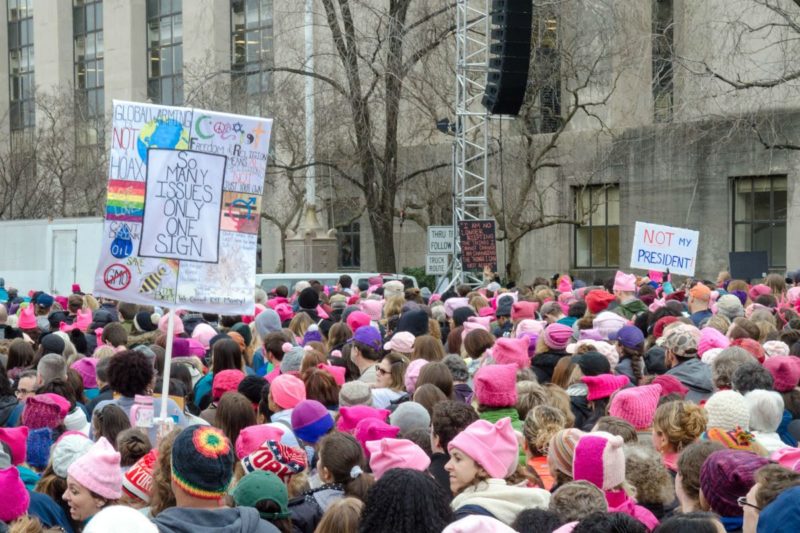
Just like hundreds of other cities and towns all over the world on Saturday, the streets of Washington, D.C., were thick with protesters who had arrived to call for justice in the face of growing threats to vulnerable people from a Donald Trump administration.
Those in the crowd expressed a variety of reasons for their attendance, including reminding others present that many in Flint, Michigan, still don’t have clean water, and demanding a halt to construction of the Dakota Access pipeline. Rewire spoke to a handful of those present to hear their stories.
“Just to Sum It Up, Girls Rock”
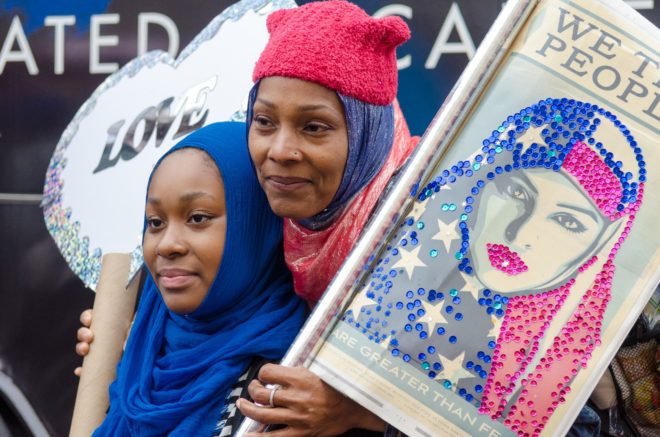
Zee Arenes (right), “29 and fine,” lived most of her life in Alaska, but now lives Maryland with her daughter, Layla Abdus-Salaam, 13, and son (not pictured).
When Rewire asked why they were at the Women’s March on Washington, Abdus-Salaam said, “I think a lot of people will see how we protest, and how we’re coming together as a community, and how we’re going to express how we feel.”
Hugging her daughter, Arenes said, “I just think love: If we love each other, we’ll love our differences, our similarities, we’ll get along, we’ll act like we should be as humans. I’m just here to spread as much love as I can.”
Arenes said that she has a son with disabilities who “wanted to be here desperately” and “cried when Trump was elected” because “he was scared we’re going to be deported because we’re Muslim.”
“There’s so many reasons why I’m here,” she continued. “Just to sum it up, girls rock. If it wasn’t for women, men wouldn’t be here! So I’m here for all the women in the world, all the men in the world, anyone who wants to bring us all together and keep us here.”
“I’m Here for My Daughters and My Grandkids”
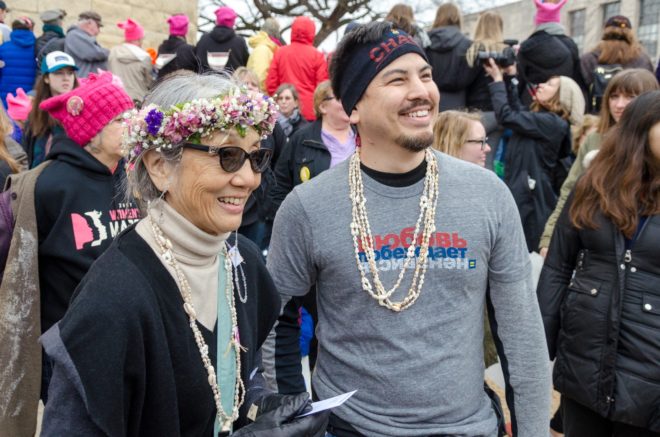
Carolyn Adler (left), 71, hails from Honolulu, “I came here to mark my presence; it’s a personal journey,” she said. “I’m here for my daughters and my grandkids because the words that Trump espouses are not what I want my grandkids to grow up with …. I think it’s important that we do this, to just let people know that we’re bigger than what’s happening in Congress.”
Her companion, Jered Branco, 36, also of Honolulu, calls Adler “Auntie Carolyn.” “Her daughter is one of my best friends from childhood,” he explained.“I’m here for all of my female friends, to support them. I’m wearing a T-shirt that says ‘Love Conquers Hate’—it’s in Russian, to make a little political statement. But I come from a marginalized community, so I’m here for myself as well.”
“If I had one word to describe today, it would be ‘YUUUUUGE,’” Branco said, laughing.
Throughout the morning, they handed out Hawaiian shell necklaces to other marchers.
“This Is Not Normal”

Jill Bryman, 42, arrived at the march in Washington, D.C., with more than 70 other people from Los Angeles, most of them parents from the same charter elementary school.
“I’m here today because we’re all mothers, and most of us our our kids are 6, 8, 10 years old, growing up only knowing the Barack Obama era, and how wonderful that was, and peaceful. The rhetoric that’s being used right now, especially during this election cycle, and by this president, are words and ideas that they’ve never even heard of, that they haven’t been introduced to. Now that they’re at the age where they’re impressionable, they’re starting to ask about them, and they see how upset we are, and I just want them to know that this is not normal, this is not the future, this is the past. And their moms are going to do everything they can to fight for them.”
“We’re also here not only to show the president, but also to show Congress, whose jobs are up in two years, that they’re going to need us. Because all these people are going to vote them out unless they get on board. We are powerful, and we are activated, and we are excited, and they’ve woken a sleeping giant, for sure,” she added.
“We Are Being Personally Attacked”
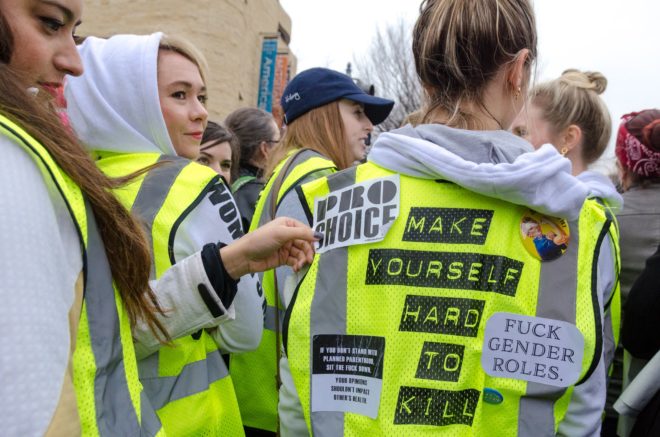
Polly Rodriguez (second from left), 30, of New York City, and her group were wearing neon yellow visibility vests she designed with “Make Yourself Hard to Kill” printed on the back.
“I wanted it to be a little extreme,” said Rodriguez. “As women, you have to ‘make yourself hard to kill’ because I feel like we are personally being attacked by the Republican agenda, especially with regard to female sexual health and wellness.”
Although there was a sister march in New York City, Rodriguez and her friends wanted to come to Washington. “This was the main march,” she said. “Being in our nation’s capital, and the juxtaposition of being here the day after Trump was inaugurated, is important.”
“It’s wonderful to be around so many women who want to speak with each other, and know each other’s names, and hear each other’s stories,” Rodriguez continued. “It’s more about collectively identifying with each other than the single individual. I feel like the entire Trump presidency is all about him, and this march is just the polar opposite—where it’s about just getting to know one another and being there for each other.”
“It’s Moving”
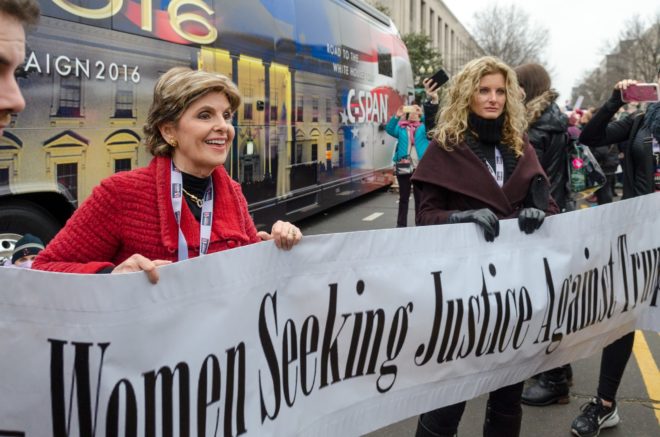
“It’s moving,” said Summer Zervos (right) of being at the Women’s March on Washington. Zervos announced last week at a press conference that she is suing President Trump for defamation.
Zervos—along with three other women (Rachel Crooks, Jessica Drake, and Temple Taggart) who have brought forth sexual misconduct allegations against the president, and her lawyer, Gloria Allred—carried a banner reading “Women Seeking Justice Against Trump.”
Many people at the march recognized Zervos from last week’s press conference and came to give her a hug and thank her for her bravery, which brought both Zervos and several of the women around her to tears.
“We’re Going To Be Loud, Really Loud”
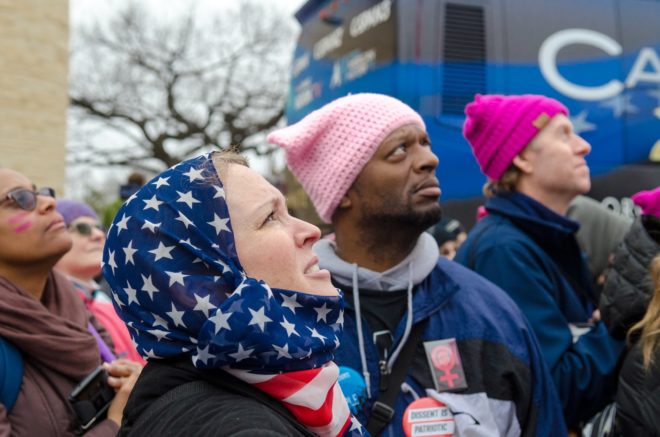
Jodi and Arthur Jackson, 41 and 49, attended the march from Charlottesville, Virginia, with their young children, Dominic, 6, and Cydney, 5, in tow.
“The biggest reason I’m here is them,” said Jodi, referring to her children. “I couldn’t stand the idea of them not being a part of this. It was not even an option, we had to. They need to know that their voice matters, that his voice matters”—she gestured to her husband—“that my voice matters. All of ours do. We needed to be a part of this to make it heard. It’s prompted a lot of really great conversations with the kids, too. They’ve asked a lot of great questions about white people, and how they’re treated differently. It’s been an education for all of us.”
Of their children, Arthur noted, “I know that on the surface they understand this, but later on, they’re going to understand even more. The fact that they understand their part right now is very important to us—their part is to continue to treat people right, equally, and fairly, no matter what they look like …”
“ … And to not be quiet, when they see others being treated improperly, or themselves being treated improperly,” Jodi continued. She added, laughing, “We’re going to be loud, really loud.”
For more photos and videos from the Women’s March on Washington, see Rewire‘s slideshow and video.
